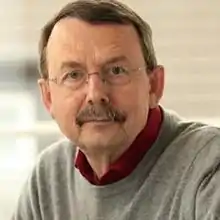Wolfgang Streeck
Wolfgang Streeck (German: [ʃtʀeːk]; born 27 October 1946) is a German economic sociologist and emeritus director of the Max Planck Institute for the Study of Societies in Cologne.

Early life
Streeck was born "just outside Münster", the son of refugees – ethnic Germans from eastern Europe displaced by the end of the Second World War. His mother was a Sudeten German from Czechoslovakia.[1]
Streeck studied sociology at the Goethe University Frankfurt and pursued graduate studies in the same discipline at Columbia University between 1972 and 1974.
Career
In 1974 he became assistant professor in sociology at the University of Münster and in 1986 finished his habilitation in sociology at Bielefeld University. Between 1988 and 1995 he worked as professor of sociology and industrial relations at the University of Wisconsin–Madison, returning to Germany in 1995 to take up the post of director of the Max Planck Institute for the Study of Societies and working as professor of sociology at the University of Cologne. He retired from his directorship in 2014, becoming emeritus director.
Work
Streeck's research is focused on analyzing the political economy of capitalism, wherein he proposes to take on a dialectical approach to institutional analysis as opposed to the more rigid varieties of capitalism. He has written extensively on the political economy of Germany and more recently has involved himself in debates over the politics of austerity, the rise of what he terms the debt-state as a result of the neoliberal revolution of the 1980s and the future of the European Union.[2][3]
End of capitalism
In 2014, Streeck wrote an article in the New Left Review where he postulates how capitalism might come to an end, discussing several factors that make this likely to happen. Streeck posits that because contemporary capitalism is beset by five disorders—declining growth, oligarchy, starvation of the public sphere, corruption and international anarchy—for which at present no political agency exists to confront them, it will continue to regress and atrophy until at some point it might end.[4] He expanded on this theme in a 2016 book How Will Capitalism End?[5][6]
Personal life
Streeck and his wife live in part of the farmyard of a castle in Brühl, a small town close to Cologne.[1]
References
- "Wolfgang Streeck: 'Look at London – it's a second Rome. This is what an empire looks like' | Books". The Guardian. 24 September 2014. Retrieved 9 December 2016.
- Streeck, Wolfgang (2013). "The Politics of Public Debt: Neoliberalism, Capitalist Development, and the Restructuring of the State" (PDF). MPIfG Discussion Paper.
- Streeck, Wolfgang (July–August 2014). "The politics of exit". New Left Review. New Left Review. II (88).
- Streeck, Wolfgang (May–June 2014). "How will capitalism end?". New Left Review. New Left Review. II (87).
- "LSE Government Upcoming Events – Wolfgang Streeck discusses his new book: How will Capitalism End?". Blogs.lse.ac.uk. Retrieved 9 December 2016.
- "LSE Government – How Will Capitalism End?". Blogs.lse.ac.uk. 14 November 2016. Retrieved 9 December 2016.